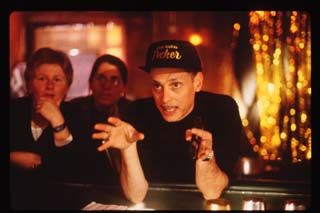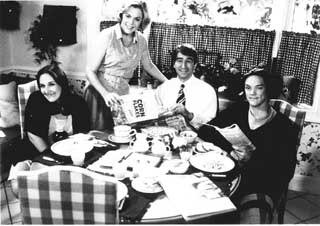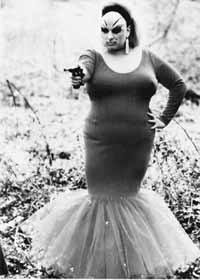Waters' Edge
By Marjorie Baumgarten, Fri., Aug. 27, 1999

John Waters is one of the most recognizable forces in the modern American cinema. He began making movies in the 1960s in his hometown of Baltimore, where he has continued to work ever since. He taught himself the mechanics of filmmaking and started reading the trade papers at the age of 12. He will perhaps always be best known for his 1972 film Pink Flamingos, the outré comic melodrama about characters who pride themselves on being the filthiest people alive (with the movie's gross pinnacle being the ingestion of a live dog turd by the 300-pound, drag queen/star Divine). The hilarious and notorious film went on to become a midnight bonanza. It's a cult classic which stands as one of the watershed movies in the canon of American alternative cinema and one of the best examples of "good bad taste."
The influences on Waters' filmmaking are many -- he absorbed everything from classic European art films to Hollywood studio productions, New York underground movies to grindhouse quickies, urban trash culture to modern gay aesthetics. He will bring what he terms his "vaudeville act" to the Austin Gay & Lesbian International Film Festival on Thursday, September 2. During this presentation, he will discuss these many influences and direct his barbed humor at the various outgrowths and artifacts of Mondo Trasho. As a prelude to his Austin appearance, Waters talked with us by phone from Baltimore.
Austin Chronicle: You were one of the first to blaze a trail known as independent filmmaking.
John Waters: Well, we didn't call it that. "Independent" was too highfalutin' a word for us to ever use. I think it was more accurate to call it underground. I remember on my first early posters the films were called a "celluloid atrocity" or a "trash epic." Those were more the terms than independent, which still sounds a little whiny to me. You know a lot of kids are using the word underground again. They're bringing it back in a way to kick the ass of the more independent whiners. But I see it as a totally different thing that's going on right now. Some of it is people who are coming out of different backgrounds or impulses. The kids are great, though. There are a lot of really young people making good movies today. So I think the American film is in very good shape.
The only problem is all the independent films have taken the screens from foreign films. There's no such thing as a foreign movie anymore. You just don't see it. In the old days, if a film got a lot of controversy everybody would run to see it. Now, they say, "Oh I don't think I want to see that." That shocks me -- that Happiness didn't make a billion dollars, because it got incredible reviews, all very, very controversial. But there are now some young people who don't want controversial. That to me is almost obscene.
AC: Now there's even backlash against something as innocuous as The Blair Witch Project.
JW: There would have to be because there was so much hype and they made so much money. I saw Blair Witch right before it came out. I think it's a wonderful thing to have an independent movie from nowhere make this kind of money. It's a great terroristic attack on Hollywood. But after you hear about a movie for so long, how good can it be? It can't live up to its hype. If you haven't seen Blair Witch by now, it's almost impossible to go see it and have an honest opinion.
AC: There's also now all the meta-publicity about how Blair Witch is the curse of janitorial crews because of all the people who become sick to their stomachs watching it.
JW: You know, that is such bullshit. They used to say that about Pink Flamingos. You know what it means? They're drunk. That's all. The audience that vomits is drunk when they get there. Because I had to try to take credit for that too in Pink Flamingos. Some theatres even put sawdust on the floors. And there were articles about it then -- people vomiting in the theatre. All it means is that young people are drunk when they come to the movie. And they're trying to take credit for it ... which I understand. I try to, too.
AC: Really? I ask because I consider you to be something of a marketing genius.
JW: That's where the Puke King title came from. Basically, I did take credit although I always knew it was just some drunken teenagers, but I pretended it was my film because it caused such a cinematic reaction.
AC: One of my favorite things I've ever seen you do is the "Gruesome Twosome" segment with gore pioneer Herschell Gordon Lewis for the TV show Split Screen. It was really marvelous listening to the two of you trying to out-top each other in shock value and marketing schemes. It was a real mutual admiration society.
JW: Oh right. I hadn't seen Herschell in years because I interviewed him many years before for Shock Value. He's a really great man. The Gentleman of Gore I think ought to be his nickname. He was a big influence. I always saw all his movies at the drive-in, and it was really new at the time. His Blood Feast -- I worshipped that. Here was a new way to terrorize people that no one had ever thought of before. That movie certainly did lead to the extremes of Pink Flamingos -- from eating a cow tongue and then in Multiple Maniacs, which was sort of my homage to Two Thousand Maniacs, I had Divine eat a cow heart and it got great reaction, so I moved on to the next. And then ended my oral adventure.
AC: One of the things that has also impressed me is this image of you as a kid sitting and watching the drive-in through binoculars.
|
|
JW: Well, that was when I was too young to go and I remember watching The Mole People, that was the one, through binoculars. Of course you couldn't hear anything. You could barely see it either, but I felt so forbidden. And now I wonder if that is the same thrill as sneaking into an R-rated movie in a mall. I don't know. I guess it is. I took one of my nephews to his first R-rated movie before he was ever allowed to see one, and the first time they said a four-letter word he was so happy.
AC: Do you think that movie titles like your recent Pecker and now The Spy Who Shagged Me have had any lasting effect on standards of acceptability?
JW: Well, the MPAA [ratings board] doesn't even know what that means. Dick used Pecker as an example with the MPAA when they had title trouble.
AC: So what do you make of all this questioning of the MPAA recently?
JW: I say it's absolutely ludicrous what they did to Eyes Wide Shut, although I thought the movie was like a bad 1970s porno flick anyway. So, basically, maybe it cried out for censorship in the spirit of The Lickerish Quartet. But to me (and this is really cinematically incorrect) but when Pink Flamingos was finally rated NC-17 when it was re-released last year for the 25th anniversary, the rating did its job. For once, we never got busted. We always got busted somewhere in the country before. I think it's the only movie ever that came out with an NC-17 that wasn't hurt by it and only helped it. But that's because it was 25 years old. Just recently Female Trouble was rated NC-17 because it's being re-released next year. To me, it was amazing that I could still make stuff that was regarded as NC-17. And we weren't uptight about it. We were like: Good.
AC: Is there anything new that can be done to shock people?
JW: I guess there is. I'm trying to think. Certainly there were things in American Pie that 10 years ago would have been impossible to have in a movie. I'm all for that. I don't think my movies are exactly like that. I think they're a little artier in a weird, kooky way, but I like those movies. I especially like There's Something About Mary. There were really moments in there that the audience was howling in laughter, which is very hard to come by even today. It's really hard to make people laugh that hard.
AC: I wonder what remains that will shock people in light of these times in which we discuss even presidential blowjobs on national TV.
JW: I still think someone is making a movie called The Oval Orifice. I don't know how the hell that porno title hasn't been used. I hope someone is doing that.
AC: I hope you copyrighted that.
JW: You can't copyright a title. It's the only thing you can't copyright.
AC: When you present something like Odorama cards [as Waters did with 1981's Polyester], how do marketing departments react to that?
JW: Well, that was part of the original pitch for the movie. And Odorama did come back when it was shown on cable television recently. They had Odorama cards you could send in and get. And they did it in France, too. Odorama has come back. New Line [the distribution company] at the time was very much behind the idea. They thought it was a good idea, they helped me perfect it, and I remember the first night we ever showed with Odorama. The thrill of actually seeing people doing it and having it work was certainly one of the high points of my life.
AC: You've always made all your movies in Baltimore and seem to be an early proponent of regional filmmaking.
JW: You can make movies anywhere now. That's the big difference from when I started out. People had to leave their town and go to L.A. or New York. You don't have to do that anymore. There are cool kids everywhere now. They do not have to leave. The best thing for American culture is to have genres that start in Texas, Baltimore ... the guy that made Election [Alexander Payne], he films in Omaha. I think that's so good. That would have been impossible 20 years ago.
AC: You seem to have learned so much about filmmaking on your feet. I've heard that when you started out you didn't realize that there was even such a thing as editing.
JW: The first movie I made[Hag in a Black Leather Jacket], I didn't know what editing was. I thought what came out of a camera was it. You realize I made Dogma 95 films way, way before there was such a thing. Dogma 63, that was me.
AC:What are you planning on doing in your Austin presentation?
JW: Well, it's my vaudeville act. I do this all over the country. I keep changing it and honing it. But what other director you know of has a stand-up act? You know, my life gets closer and closer to Buddy Hackett's as I grow older.
AC: Will this appearance speak especially to the gay film festival audience?
JW: I find it so ironic today that gay is no longer shocking. To me, there are gay characters on every sitcom. So what we have to do is make gay dangerous again. I'm never for family-friendly gay pictures. I think a drag queen should horrify a family. I think families should run up the street in fear at a drag queen and not want to invite him home for a family dinner. Eventually, if filmmakers continue in what gay liberation really means, there will be no gay film festivals because it will all be totally assimilated. It will just be: Is the movie good or bad? And I think that is an important thing about a gay film festival. I'm not for segregation. I'm not for all-gay bars or all-straight bars. To me, sex should be terrorism. It should be all straight and gay hanging together. To me, that is what is exciting about sexual differences -- that you get to see other people. That you get to hear about other people's worst nights, you know? I believe that the ultimate test for any sexual minority is that if you can laugh about the worst thing that ever happened to you because of sex, you'll be the strongest minority of all. And I think gay people are very good at that. To me, there's a huge freedom for gay filmmakers. But I recommend that all filmmakers make good movies that happen to be gay, not just a gay film. I mean, do black filmmakers come out and say, I'm only going to enter it in black film festivals? That's almost racist. So, to consider whether it is good or bad because it's gay is almost offensive to me. I'm a hetero-friendly gay kind of guy.
AC: There are such strong family units in your movies, "alternative" though these units may be.
|
|
AC: That's part of what I see as the sweetness in your movies -- your obvious love for the characters.
JW: Even the most extreme movies were basically joyous at least. And the people who are bitter and the people who judge other people, usually, are punished in my movies.
AC: Ultimately, you use humor as a tool.
JW: It's political humor. It always has been. The only way you can ever change anybody's mind, or get them to accept something they didn't accept before you, is to make them laugh. Then you have them a little bit on your side. As soon as they laugh they're open to new ideas. Humor is a weapon, it's political. It's how I judge everybody -- through their sense of humor about themselves. Humor is the ultimate personality test. You can tell everything about people by whether they have a sense of humor or not.
AC: Do you regard yourself as a political filmmaker?
JW: Well, I wouldn't ever be as pompous as to say that, but if someone else did, I wouldn't deny it. Because, to me, humor is political. Yes. And if I can make anybody accept something that they maybe did not before they saw my movie then that is political. You can't say it isn't. But I don't sit down and try to say I'm making this political thing. There was an article once called "The Politics of Pink Flamingos" that was hilarious to read because it was a Marxist analysis and certainly not what I thought about while making the movie. But when you read it, it was still a good critique of the movie.
AC: Although your movies focus on fringe groups of outsiders, family values and alternative family units still survive.
JW: My movies are all about family values. My movies reflect a certain sense of humor that is very much alive in America. Not necessarily the main sense of humor, but they are a very loud footnote.
AC: How do you see your place in the history of American filmmaking?
JW: I never have a burning message. I'm lucky enough to have been doing this for 30 years. My name is certainly, hopefully, all over the world. I think I'm lucky enough to have people who will come see my movies every time. It's not a huge audience but it's enough to make people give me the money every time to do it. And they're all united by a good sense of humor and a basic hatred of authority.
An Evening With John Waters is a presentation of the Austin Gay & Lesbian International Film Festival and the Austin Film Society. The event takes place Thursday, September 2, 8pm, at the Highland 10 Theatres. Advance tickets go on sale Friday, August 27. Admission is $12.50. Tickets may be purchased by phone with a credit card by calling 302-9889, or in person at the ticket office in Dobie Mall.










